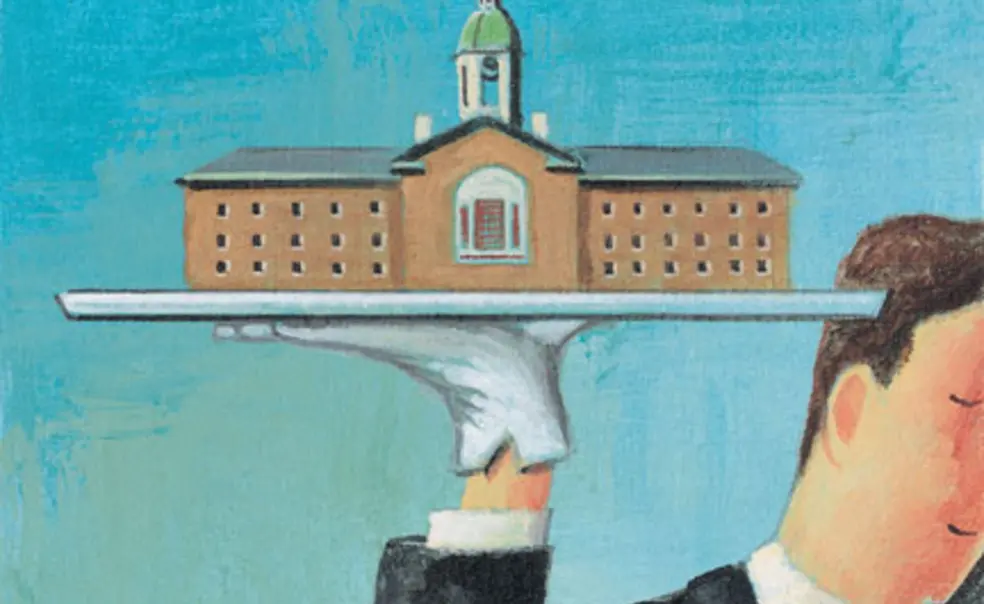P.G. Sittenfeld ’07 is a Marshall scholar studying at Oxford University and has co-founded a voter-outreach organization called Vote From Home (www.votefromhome08.com).
Alumnihood happens fast. Arguably, it begins the day freshmen arrive on campus: the frequent singing of “Old Nassau”; the splendiferous profusion of orange and black attire; the swirling rumors that God Himself attended Princeton. Sure, for the next four years the young minds that roam campus are called “students,” but they also are alumni-in-training. After all, one’s time as a student passes in a flash, while we spend the rest of our lives as alumni.
Mentally letting go of being an undergrad isn’t easy. I learned this when I returned to campus for my first reunion last spring. No doubt, Princeton always has open arms for its alumni — but I still couldn’t escape the sense that I was there as a visitor. Princeton, I realized, belongs first to the students who sleep and eat and study and play there — and that’s as it should be. For those of us who have processed through FitzRandolph Gate, Princeton offers a different kind of home: the simultaneously vast yet cozy, omnipresent but intangible realm of alumnihood.
One of my first tastes of alumni life came at a weekend of Princeton festivities in London in June. For the last year, I’ve lived in England as a graduate student at Oxford. When I received my invitation from Old Nassau, I imagined a collection of tweedy British-born Princetonians nibbling crumpets and sipping Pimm’s. I should have known better than to succumb to such caricatures. In fact, there was nothing particularly Anglo about the occasion. Festivities were inaugurated with a Friday-evening cocktail party at a snazzy central London museum, dramatized by soaring ceilings and 18th- and 19th-century artwork on the walls. Over cocktail banter, British accents were few and far between; most attendees had traveled from the United States for the event or were Americans living in the United Kingdom. English ale — the lifeblood of the country — was nowhere to be found. It felt as if an event at Prospect House, with the normal cast of characters that one might find there, had been picked up and plunked down 3,500 miles away. The spark of Princeton’s take on alumnidom, I realized, is that the University can export it anywhere.
The crowd included some of Princeton’s most important leaders and donors, and more heavy hitters were brought in for the following day’s lectures on topics such as technology and the arts. The script was well-written, the execution perfect. At Friday evening’s gathering, President Tilghman, beaming warmth and wisdom, offered a few remarks and encouraged everyone present to “aspire” with a capital A: the new code word for “hand over your moola.” In a brief video played on multiple flat screens, some of my schoolmates declared their aspirations: “Improve health care for everybody in every country”; “Address the world’s energy crisis”; “Foster progress in the Middle East.”
Looking around the room, I noted proud smiles: I suspect the alumni were reminded of the eager and idealistic students they had been at Princeton. I imagined offering my own vision for how I can be of service to the world. I then glimpsed myself in context: standing in jacket and tie, schmoozing away with a glass of sparkling white wine in one hand and a mini-quiche in the other. Which of these portraits of a Princetonian, I wondered, would be the reality of my life as an alum?
The reasonable answer, I think, is both: Alumni can enjoy the good life and still heed the call to give back. In that way, I like to think such events are helpful conditioning. I ended the weekend feeling that I owe Princeton something. And the truth is, I do: The University provided a magical environment for personal and intellectual growth, and I’ll always be indebted.













No responses yet